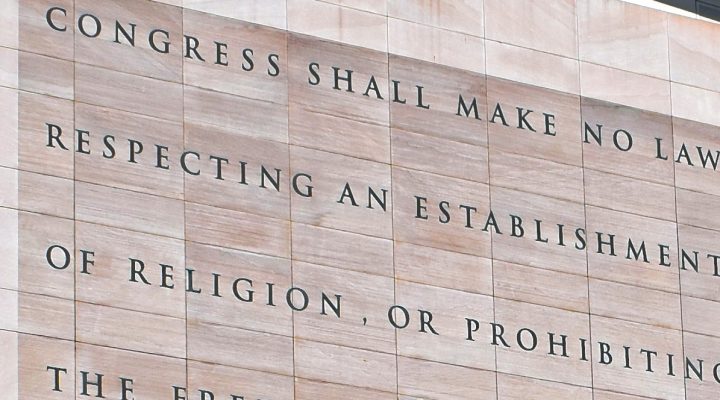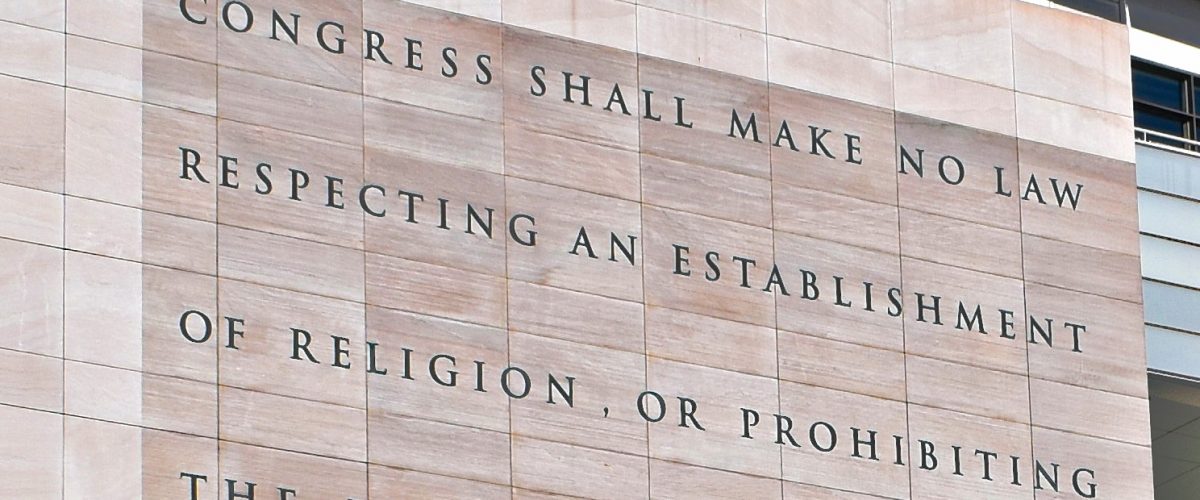Americans deeply value the First Amendment, but increasing numbers of people don’t understand the protections and limits of the doctrine, according to new research by the Freedom Forum.
And while support for the five freedoms guaranteed by the First Amendment is strong, it is not universal. A small but increasing share of Americans do not value those same protections today and might not endorse them if put to a vote.
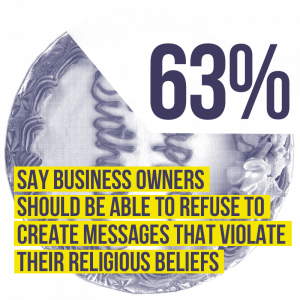 A summary of the survey notes: “When asked to choose whether the First Amendment should never be changed, 62% said it should not. That’s up from 54% in 2020. However, more leaned toward thinking the First Amendment goes too far in the rights it protects: 7% compared to 3% in 2022.”
A summary of the survey notes: “When asked to choose whether the First Amendment should never be changed, 62% said it should not. That’s up from 54% in 2020. However, more leaned toward thinking the First Amendment goes too far in the rights it protects: 7% compared to 3% in 2022.”
Yet, “overall, 93% of Americans consider the First Amendment vital.”
This new research was conducted online March 10 to 14, using a representative national sample. The study’s margin of error is 3.45% at a 95% confidence level. The Freedom Forum is a nonprofit and nonpartisan organization committed to education and advocacy related to First Amendment freedoms.
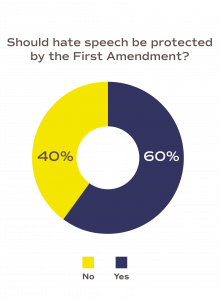 The new survey offers comparable data to a similar survey in 2020. The most notable changes are these: “While overall awareness of the First Amendment remains high (95%), awareness of each of the five freedoms protected by the First Amendment — religion, speech, press, assembly and petition has dipped slightly since 2020. The ability to name First Amendment freedoms and to identify them from a list of options have both decreased.”
The new survey offers comparable data to a similar survey in 2020. The most notable changes are these: “While overall awareness of the First Amendment remains high (95%), awareness of each of the five freedoms protected by the First Amendment — religion, speech, press, assembly and petition has dipped slightly since 2020. The ability to name First Amendment freedoms and to identify them from a list of options have both decreased.”
Views on the First Amendment today are sometimes shaped by current events, including high-profile court cases that touch on religious liberty and freedom of speech, particularly when those two ideals appear to be in conflict.
The survey found:
- 64% of Americans can correctly identify freedom of religion as a First Amendment right, down from 75% in 2020.
- 63% believe a baker or website designer should “be able to refuse to create a message that celebrates an occasion, cause or event that violates their religious beliefs.” This has been the subject of repeated litigation brought by religious conservatives who oppose same-sex marriage.
- 64% correctly believe elected officials may reference religious ideas or their personal religious beliefs while operating in their official capacity.
- 60% believe hate speech should remain protected by the First Amendment.
- 66% believe college campuses should foster the free expression of ideas even if they’re offensive to some, up from 59% in 2020. This also is an idea prominent in news coverage of efforts in Florida and Texas and elsewhere to limit or rewrite what is taught in public schools.
- 21% see the press as a threat to liberty, while 36% see it as a liberator. This, too, is a matter of current concern as Donald Trump declared to his political base that the mainstream media is an “enemy” of the people and as more narrowly partisan media outlets have emerged. Members of Gen Z are least likely to say the First Amendment is extremely vital overall compared to older generations.
One notable gap in American’s knowledge of the First Amendment is this: “Most Americans do not know that the First Amendment applies only to the government limiting rights. Just under one-quarter (24%) know that private workplace policies are not bound by the First Amendment.”
Here are highlights of the survey’s findings as they relate to the five freedoms named in the First Amendment:
Religion
- With 64% able to identify it, religion is the second best known First Amendment freedom after freedom of speech.
- Few (11%) consider it the most essential First Amendment freedom.
- The younger the respondent, the less likely the person is to consider religion the most valuable among the freedoms.
- 63% say business owners should be able to refuse to create messages that violate their religious beliefs.
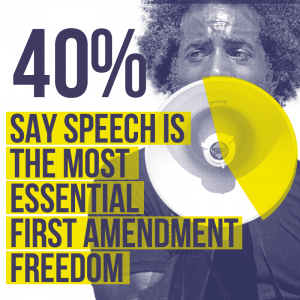 Speech
Speech
- Freedom of speech is the best known and most valued First Amendment freedom, with 40% saying it is the most essential First Amendment freedom.
- Nearly all (91%) can identify it as a constitutional right.
- Half or more of Americans know that books, music, movies and music videos are protected by the First Amendment as types of speech. Fewer identify paintings, sculptures and internet memes as protected by the First Amendment. Thirty percent of respondents mistakenly say none of these types of expression are protected by freedom of speech.
- 59% (up slightly from 53% in 2020) know flag burning is a protected form of expression. Yet 59% erroneously say public school students can be required to recite the Pledge of Allegiance.
- Six in 10 Americans know books are protected by the First Amendment.
- 66% (up from 59% in 2020) believe it is important that college campuses foster the free exchange of ideas, even if those ideas are offensive to some.
- A growing proportion since 2020 (40%) say preventing hate speech is more important than protecting free speech and that hate speech should not be protected.
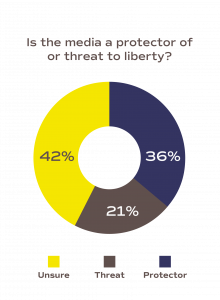 Press
Press
- 61% can identify press as a First Amendment freedom. Just as many also say it’s important for the news media to be a watchdog on the government.
- About one-third (36%) see the press as a protector of liberty compared to 21% who view it as a threat. A further 42% did not lean strongly either way.
- Among respondents who see the press as a threat to liberty, 41% believe the news media is politically biased.
Assembly and petition
- 57% recognized assembly as a First Amendment freedom, down from 67% in 2020. Petition remains the least likely to be correctly identified as a fundamental freedom with only 41% of respondents able to do so.
- Most Americans (86%) know college students may protest invited speakers on campus. However, 68% of Americans falsely believe school administrators may limit high school students’ rights to protest on public school grounds simply because the administrators don’t like the cause.
- 68% say that irrespective of the opinion voiced, everyone should be able to speak at a public meeting subject to reasonable rules and time constraints.
- A small minority (10%) would be open to banning or escorting certain speakers out of public meetings to maintain decorum.

